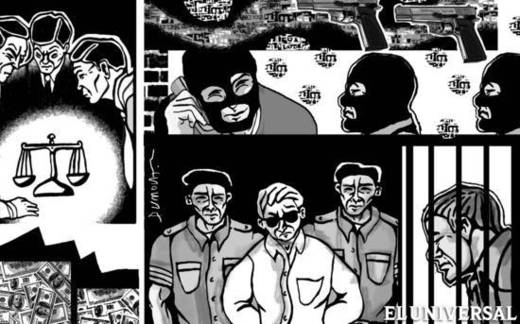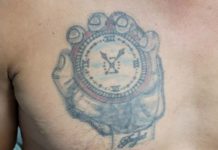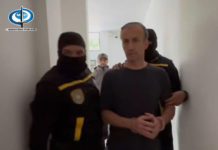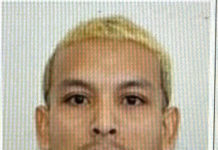
Major Milton Revilla was given a six-year prison sentence after being found guilty for endangering the FANB’s security. His defense lawyers believe this concerns a political case
 |
He was accused of spying and high treason. Revilla was labeled as a secret agent from the CIA, of leaking “classified” information to the media of opposition groups and plotting against Hugo Chávez’s Government. Those reasons explain why Military Trial Court pronounced a six-year prison sentence. Retired Army Major Milton Revilla Soto is at Ramo Verde jail along with some other military men viewed as “enemies” of the revolution and the FANB (Bolivarian National Armed Force).
Nevertheless, his story does not either begin or finish with this sentence. His defense lawyers deem the case as political: “He is a political prisoner,” claims Deputy Andrés Avelino Álvarez, who advocates his cause at the National Assembly and in foreign agencies.
Since 2000, when Major Milton Revilla -then Captain- was appointed commander of the Border Protection Base located in Catatumbo, to the south of Lake Maracaibo, he has being taking a road different from his superiors’ requests.
Thanks to such attitude, Revilla turned into a pain in the neck for the new ideology that that started to impose since that very moment at the FANB. From his position, he combated the 33th Front of the Colombian Revolutionary Armed Forces (FARC) which operate in that area; denounced irregularities of Plan Bolívar 2000 and put in evidence the support provided by sectors from his own army to the FARC.
An incident that the Military Intelligence Division (MID) could not forgive was having revealed the presence of ETA member Arturo Cubillas in a FARC-dominated territory. It is worthwhile noting that Cubillas is wanted by the Spanish Audience for terrorist acts and he was granted asylum by the Venezuelan Government. Such stance made him formidable enemies inside the Army division. They claim that Revilla’s acts even annoyed the very President Chávez. He was finally removed from the frontier base in 2004; however, the pursuit of this official continued even after his retirement in 2005. Even as a civilian, he kept on denouncing the existing links between the Bolivarian Government and the FARC and acted as well as an analyst and source for some journalists regarded as “enemies of the revolution.” Such activities would eventually cost his career and his freedom.
Breaking off ties with the FARC
In September 2000, Army Major Milton Revilla, after being appointed commander of the Border Protection Base (BPB); he took on the position under the prevailing conception in the army by then, that is, “integral defense of the territory.” It dealt with combating all the irregular forces in the area, fighting especially those subversive groups declared “enemies” of the Venezuelan State by then.
The first surprise he got was that on day 4 of his stay at the frontier base, he received a letter from Commander Rubén Zamora, the head of the 33th Front of the FARC which operated in Río de Oro. In such letter, Zamora welcomed him and concluded with the following: “equality in the Bolivarian fight for the peoples’ freedom.” He found out that Zamora used to have direct communication with the T02, requesting for ready access of people, food and fuel to his guerrilla camp. According to his complaints, from Military Operational Theater Number 2 direct phone calls were generally received, ordering the permit to enter materials into the FARC camps.
As a result, Revilla implemented more extreme control measures and started to confiscate merchandise that headed from Venezuela to the FARC. Additionally, he would interdict cocaine precursors; cash used to pay cocaine growers and dismantled three laboratories settled in Venezuelan territory. As a consequence to such activities, the local chapter of the Military Intelligence Directorate (DIM) initiated an investigation into him. In January 2001, he was removed and transferred outside the operations area. The unit was dismantled.
In February 2002, he was again appointed second commander of 131 UTC in Military Operational Theater Number 2, under the command of General Wilfrido Cruz Weffer. During his stay in that Army unit, he managed to finally disrupt the logistical supply of the guerrilla, especially that of the 33th Front.
Through intelligence reports, he learned from the existing link between one of the logistical leaders of the 33th Front, Nelson Pinilla Daza, and the DIM head in Machiques, Inspector Edgar Castillo. Pinilla was pursued and arrested. At the same time, Revilla received a phone call from the very leader of the 33th Front, Rubén Zamora, requesting “immediate freedom” for Pinilla Daza. A Colombian citizen holder of a Venezuelan ID card, Pinilla Daza was given a three-year sentence in prison for possession of weapons; the crime of “military rebellion” could not be proved. Seven months later, he was released under conditional freedom and was found murdered afterwards.
Another denunciation made by Revilla was the case concerning airplane Bronco OV-10 of the Venezuelan Air Force (FAV) shot down by the FARC. The event happened when this airship raided the 33th Front camp of the FARC by mistake of coordinates, as the attack was aimed against a paramilitary camp. The aircraft was piloted by Lieutenant Fabián Castellano who had to eventually eject himself. The very guerrilla group led the Venezuelan military men to the site where the crashed airplane was and also handed over the dead body of the pilot to them.
Revilla Soto documented and submitted all his complaints to his superiors and also in different bodies during those years of active performance.
ETA members at the frontier.
Milton Revilla’s complaints include a record filed by him at the border base about a group of ETA members who traveled to Río de Oro in January 2001 protected by the then DIM Inspector in Machiques, Edgar Castillo. Major Revilla remembers that the inspector opposed to the travelers being listed at the frontier base; act that Revilla did not support. At the beginning, Revilla did not know who these people were; however, later on, after investigating their identities, he found out that the group was led by Arturo Cubilla who has been pursued by the Spanish Government, and accused of terrorist acts.
Due to these denunciations, Major Milton Revilla was invited by the Spanish National Audience to appear in the Central Magistrate’s Court as a protected witness. For this purpose, Revilla had to produce evidence of the presumed training that this ETA group was providing at FARC camps. The appearance in court was due on July 2011 and for that, the tribunal granted him the status of “protected witness.” Nevertheless, Revilla was not able to attend the trial and testify as he had been arrested since June 8, 2010 and was facing trial with prohibition from leaving the country. His defense lawyers requested the permit from the Martial Court and other instances; nevertheless, the request was denied.
Revilla’s arrest
On June 8, 2010, at some point in the afternoon, Major Milton Revilla was captured at the Maiquetía international airport when he headed for Lima with the intention to attend a conference hosted by Tomás Moro School of Government. At the moment of his detention, neither a bench warrant nor an arrest notice was produced. Afterwards, the reason of his detention was brought to light: the DIM had been conducting investigations on him for quite a long time.
According to a written document; it is believed that at the time of his arrest, the whole examination boiled down to why he kept in touch with journalist Patricia Poleo and analyst Orlando Ochoa Terán.
Already retired from the army as active military for five years, Revilla had contact with journalists and media outlets to whom he had supplied information about the FARC.
On June 10, he was taken to the Military Control Court and was attributed the offences of high treason, espionage and plotting against the Nation.
On July 23, 2010, describes the officer, he met with the public prosecutor, Colonel Freddy Ramírez Espósito, who confessed him his case was merely of political nature and that he was not really the target. For such purpose, he was asked to publicly declare through a team of state-run TV channel Telesur, that as a secret agent he had paved the way to US penetration with the support of Patricia Poleo and Orlando Ochoa Terán. Revilla Soto says he was threatened by the public prosecutor to face prison and lose his pension if he failed to cooperate. Nonetheless, during the recording, Revilla declared the opposite of what was agreed; reporters opted to leave by alleging that “such act was against journalistic ethics.”
Due to his refusal to cooperate with the DIM, he was held prisoner in the basements of that organism for nine months, until he obtained an precautionary measure for conditional freedom. Finally, after the offences of high treason and espionage were dismissed, Milton Revilla was given a sentence to six years and four months in prison for offences “against the security of the National Armed Forces.”
twitter:@folivares10
Translated by Adrián Valera Villani










